When Do Parents Trust Their Children With Materials at the Library?: Book Censorship News, December 15, 2023
Book Riot and the EveryLibrary Institute have spent this fall developing and deploying a series of research surveys related to parental perceptions of libraries. The results for the first two surveys — what parents think of public libraries and what parents think of librarians — are available, and the third survey — covering parental perceptions of school libraries — will be published soon. Each survey stands on its own and offers a cross-section of data worth considering in light of the ongoing assaults on public institutions like libraries and schools.
Some even more interesting insights emerge when similar questions appear across surveys. In different contexts and with different participants, are there trends or discrepancies?
A couple of weeks ago, I looked at parental trust in public libraries. This week, let’s look at what parents had to say about what age they feel is when their children are able to select their own materials at the library. Keep in mind that most books banned are written, published, and shelved for young adults aged 13-18, as well as middle grade and children’s books, including picture books. In other words, books being banned are primarily those developed with young readers in mind.
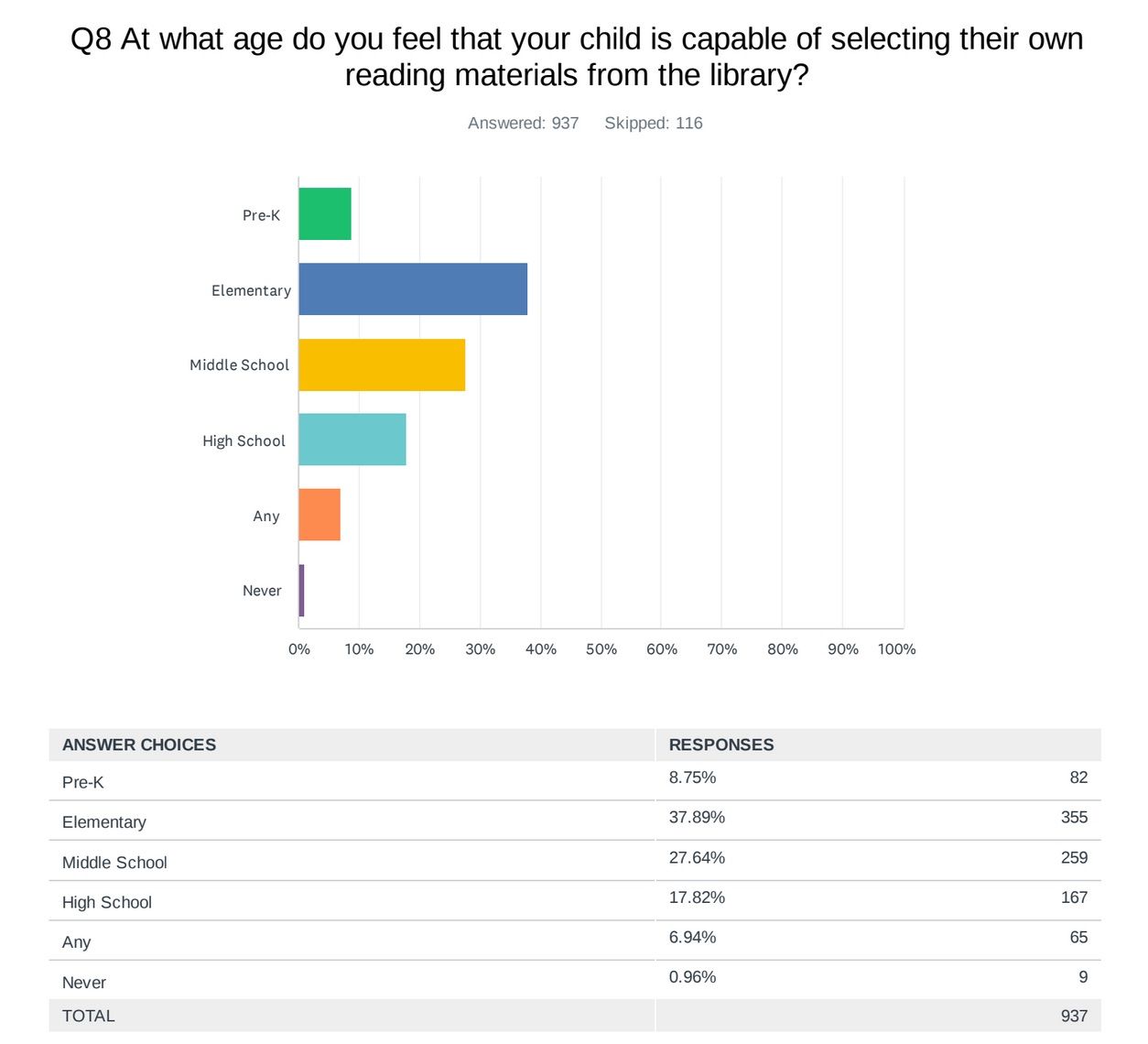 |
In the survey of parental perceptions of library workers, responses suggested that the majority of parents are comfortable with their children selecting their own materials in elementary school, followed by middle school, then high school. A small number are comfortable with children selecting their own material before kindergarten, while a minuscule number are never comfortable with their children selecting their own materials.
These numbers make a lot of sense when taken in context with another set of survey questions from this same survey. Parents overwhelmingly trust their children to select appropriate material, and part of it is because of their overwhelming trust in library workers to have materials on shelves that are age and developmentally-appropriate.
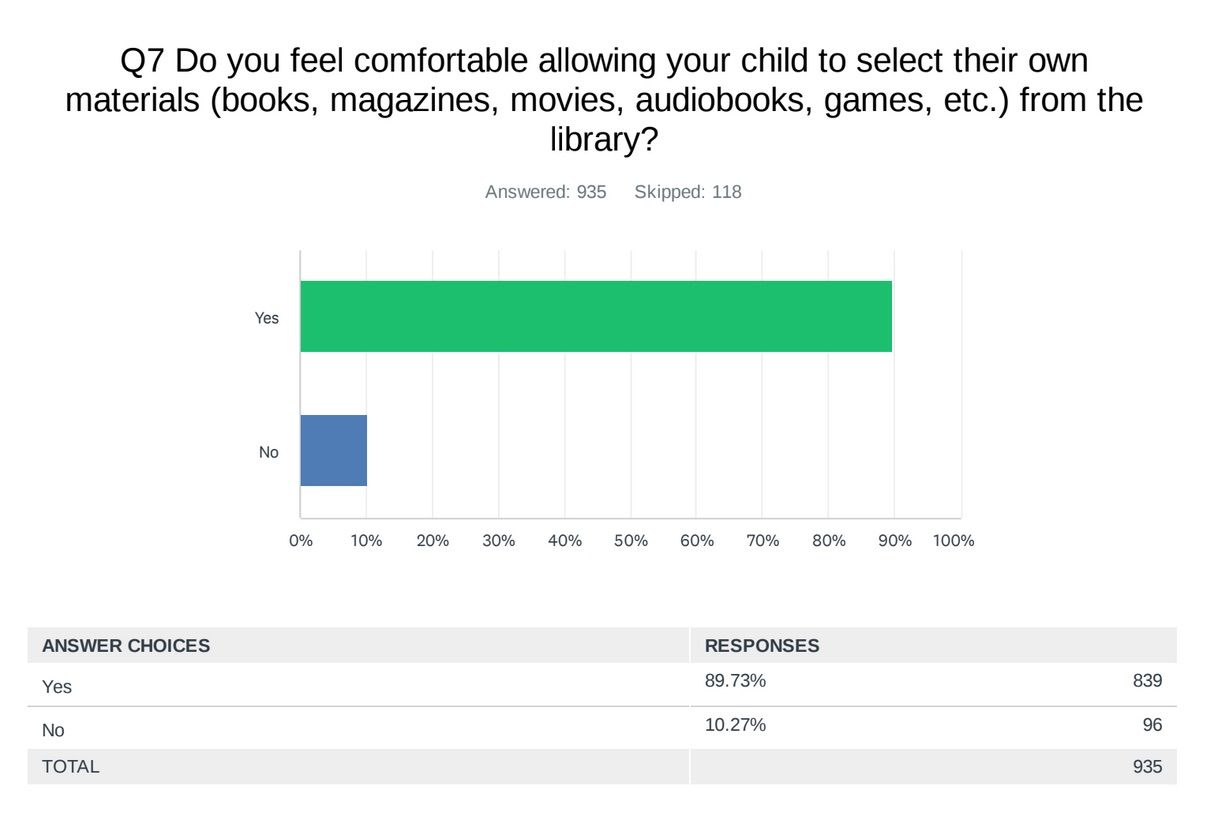 |
Nearly 90% of parents trusted their children to select appropriate material.
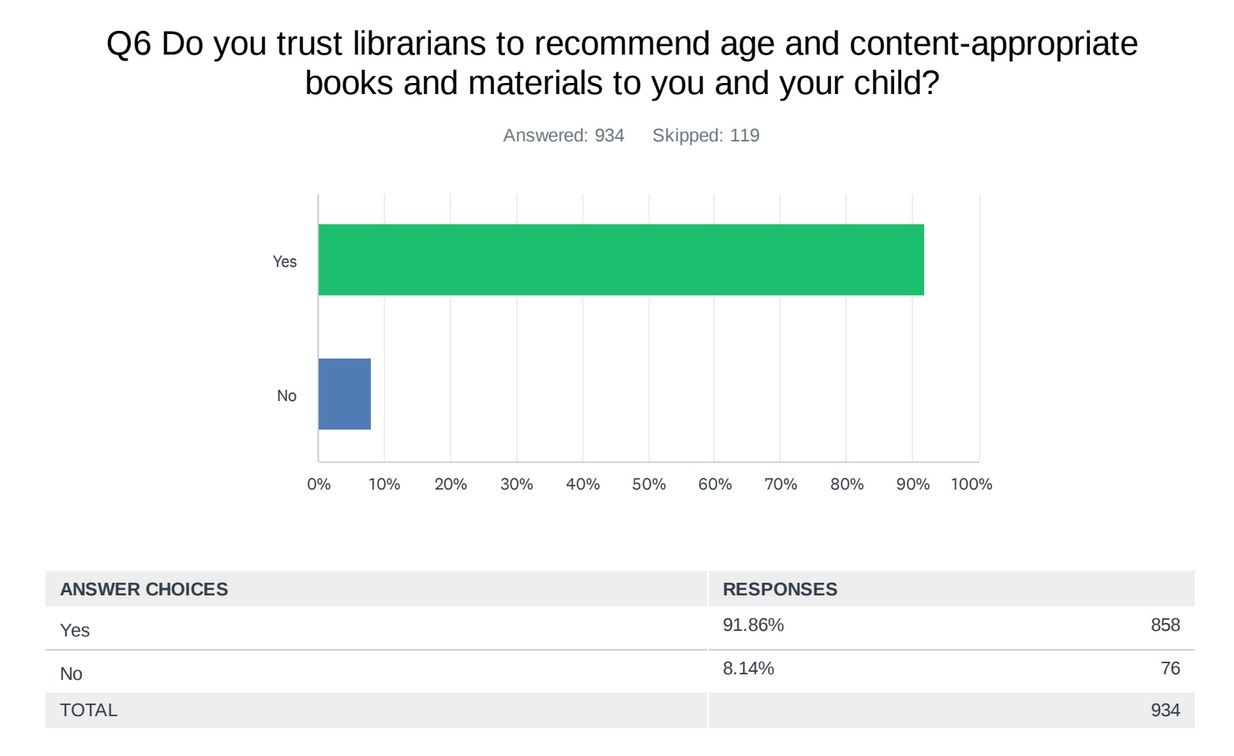 |
Coming in even slightly higher, at 92%, is the trust parents have in librarians selecting and recommending age-appropriate material.
A similar, though slightly different, question set to these was asked in the first survey. First, did parents ever experience having their child borrow a book that made them (the parent) uncomfortable? Then, we asked whether their child had ever borrowed a book that made the child feel uncomfortable.
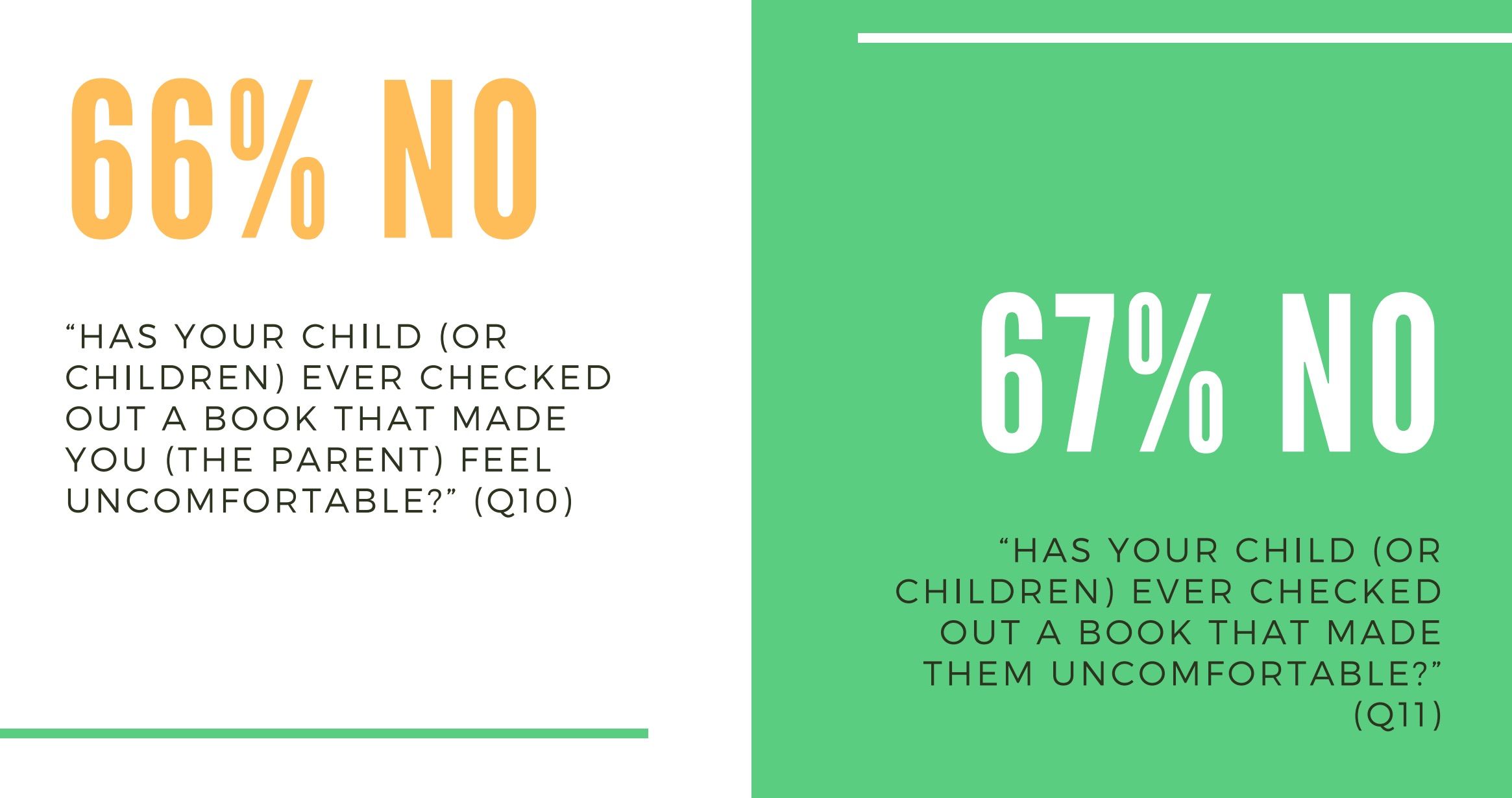 |
For both questions, the answer was 2:1 that no, borrowed books had not made either the parent or child uncomfortable. This aligns nicely with what parents said about when they feel comfortable letting their children borrow materials — though, in some ways, these numbers feel low.
All of these questions were asked in the abstract, of course. They offer little context and indeed, likely encourage survey participants to think about the library in some imagined way. The library has always taken on a fantastical and mythical air when talked about by the general public. It’s a community good, of course, and for many, it’s steeped in childhood memories as much as it is perceived as a neutral, apolitical body. This mentally constructed image is one of the reasons why vocational awe in librarianship is pernicious.
Of course, the moment context is added, perceptions change. The library is not neutral, and it never should be. Right-wing politicians and media have taken advantage of the myth of neutrality to malign libraries and their workers, and their rhetoric has been successful. The manufactured crisis over Critical Race Theory bled into a manufactured crisis about Comprehensive Sexuality [sic] Education, bled into a manufactured crisis about Social Emotional Learning, all rolled into the less-spoken-about ultimate goal of destabilizing public institutions in order to pour taxpayer money into private industry via voucher programs.
It sounds hyperbolic but…the impact is seen right here in these very surveys. The same parents who are comfortable with their children borrowing materials sing a different tune about the faith they have in these institutions when confronted with the fact they live in diverse communities.
Take the results from the first survey, which asked parents to express when they felt their children were ready for books on the following topics:
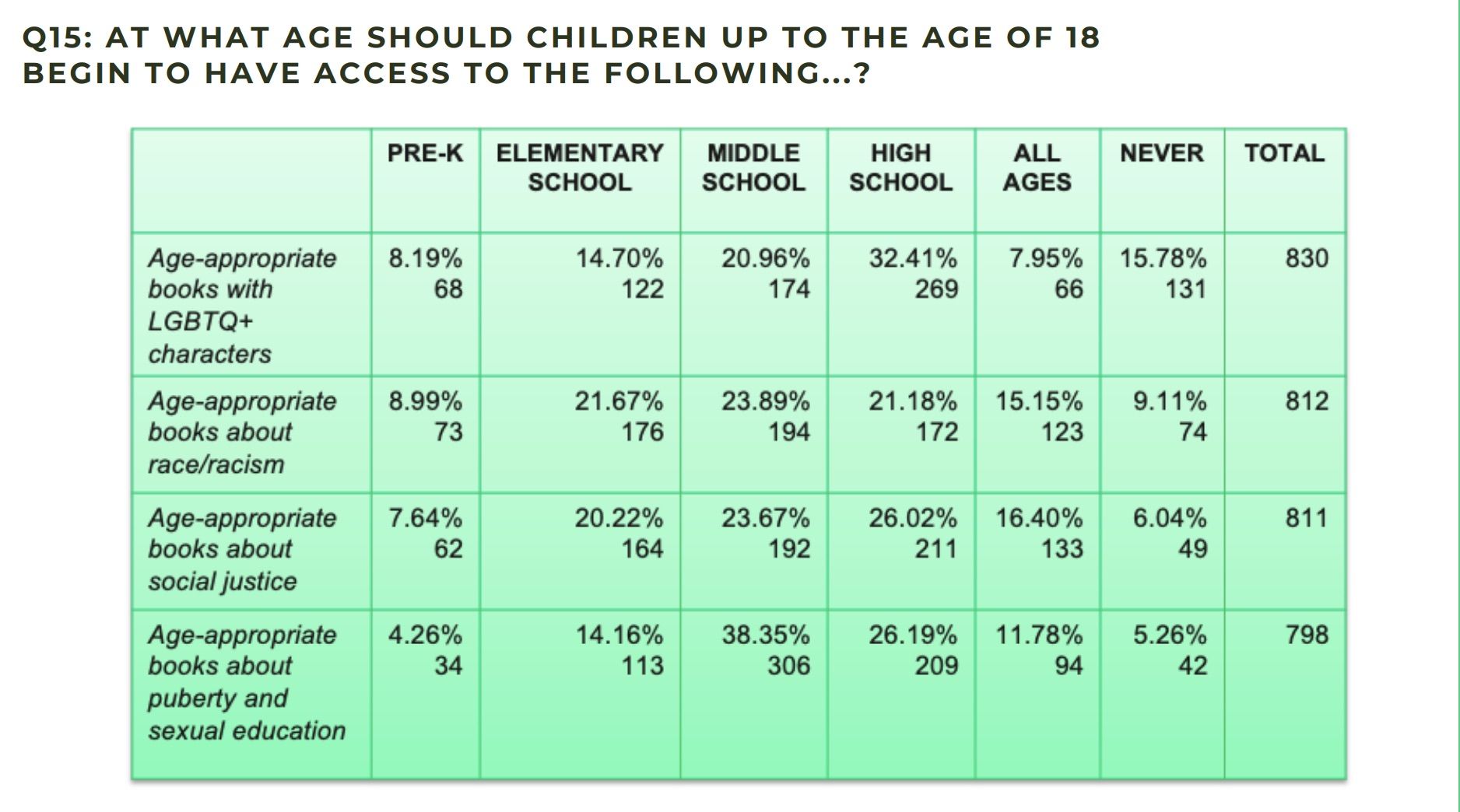 |
Suddenly, 15% of parents think no one under the age of 18 should have access to age-appropriate books with LGBTQ+ characters. That’s age-appropriate, and LGBTQ+ characters are no longer deemed appropriate for any child to access. We see smaller but still concerning numbers of parents deeming it never appropriate for those under 18 to access books written for them on the themes of race/racism, social justice, or puberty/sexual education.
What happened to the near-universal agreement that parents felt about comfort with their librarians recommending age-appropriate material and the comfort they felt about letting their children borrow materials? Successful rhetoric by the far right, married with the reality that when provided context, people show their bigotry more openly.
It only gets more troubling, though.
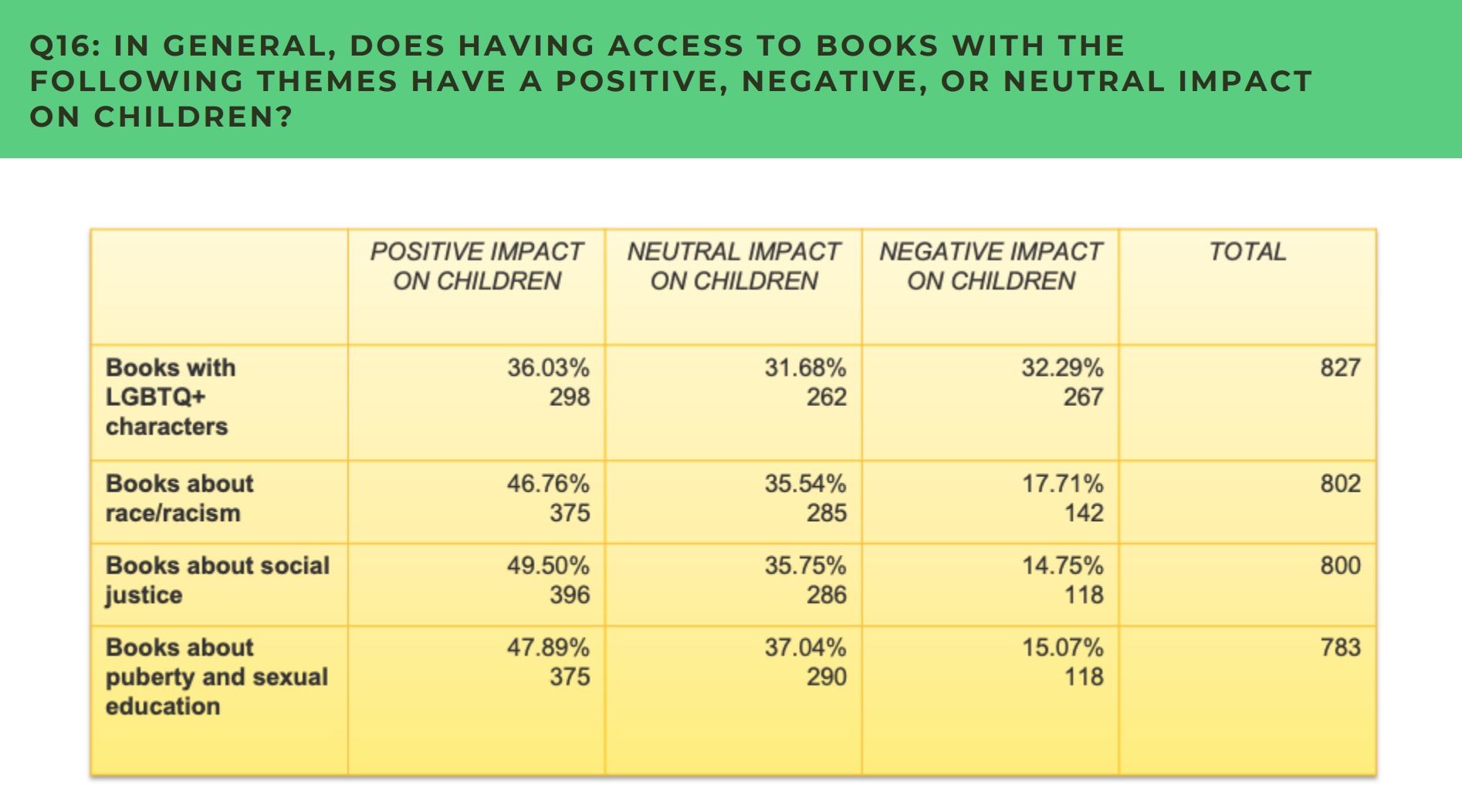 |
In almost 2:1 results, most parents thought mere access to books with LGBTQ+ characters had a neutral or negative effect on children.
Maybe it’s time to stop being shocked that when politicians use words like “LGBTQ+” in conjunction with “pornography” or “obscene” or “inappropriate” — a calculated, purposeful act — that has a direct impact on libraries and not just on the perceptions parents hold.
It trickles down in such a way that minors start to lose access to entire parts of their public libraries. Yes, the very same public libraries good liberals like Stephen King say that kids who have books banned at school can haul their butts to.
This week, it was Sumner County Public Libraries in Tennessee (where, earlier this year, one of the directors was fired for not being nice enough to library provocateur Kirk Cameron).
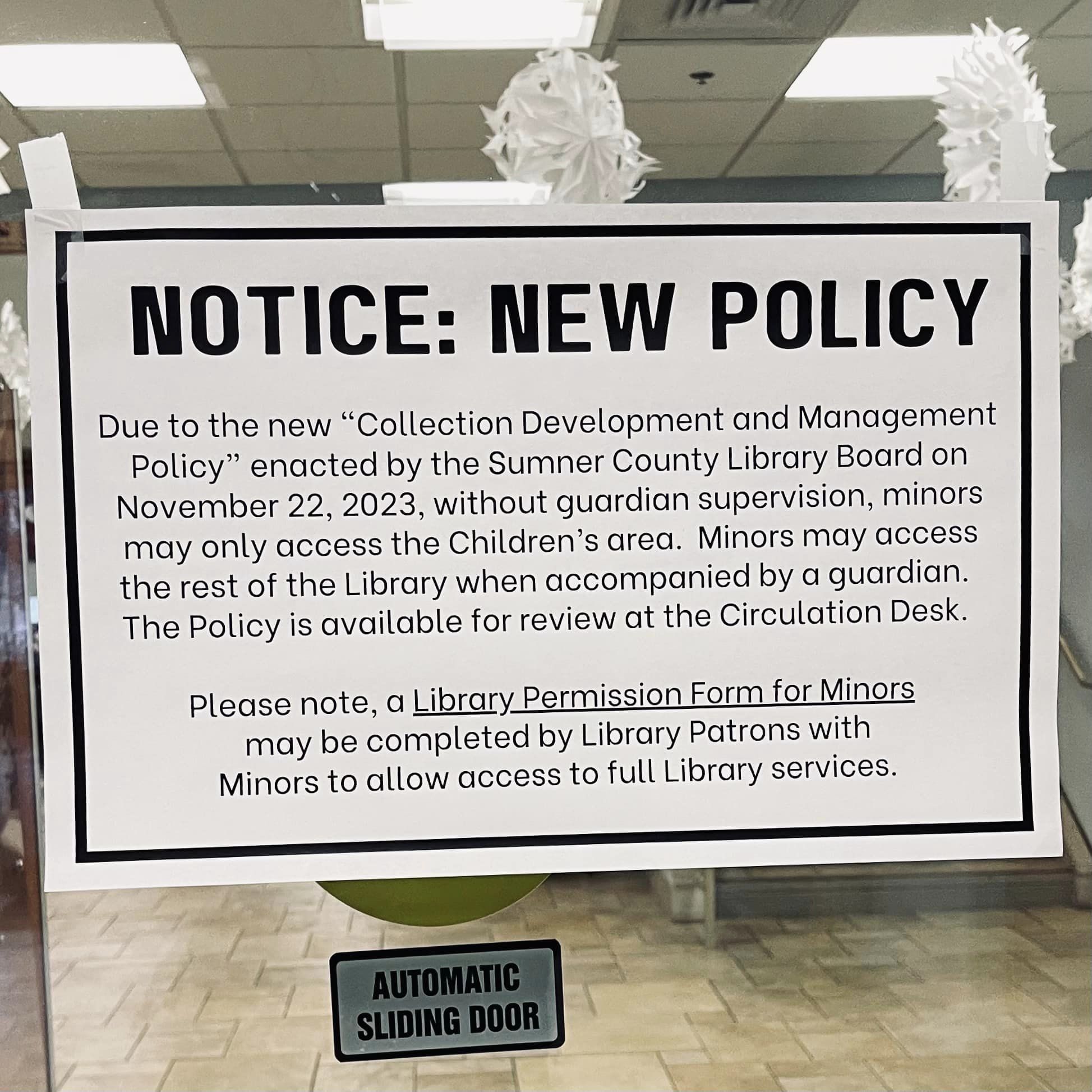 |
In some of the Sumner County Public Libraries, to even access entire parts of the public library, those under 18 need permission from a parent or guardian. They can’t get a research book for a paper at the public library but can drive to that library and can access porn right from the phones in their hands.
This is the permission form:
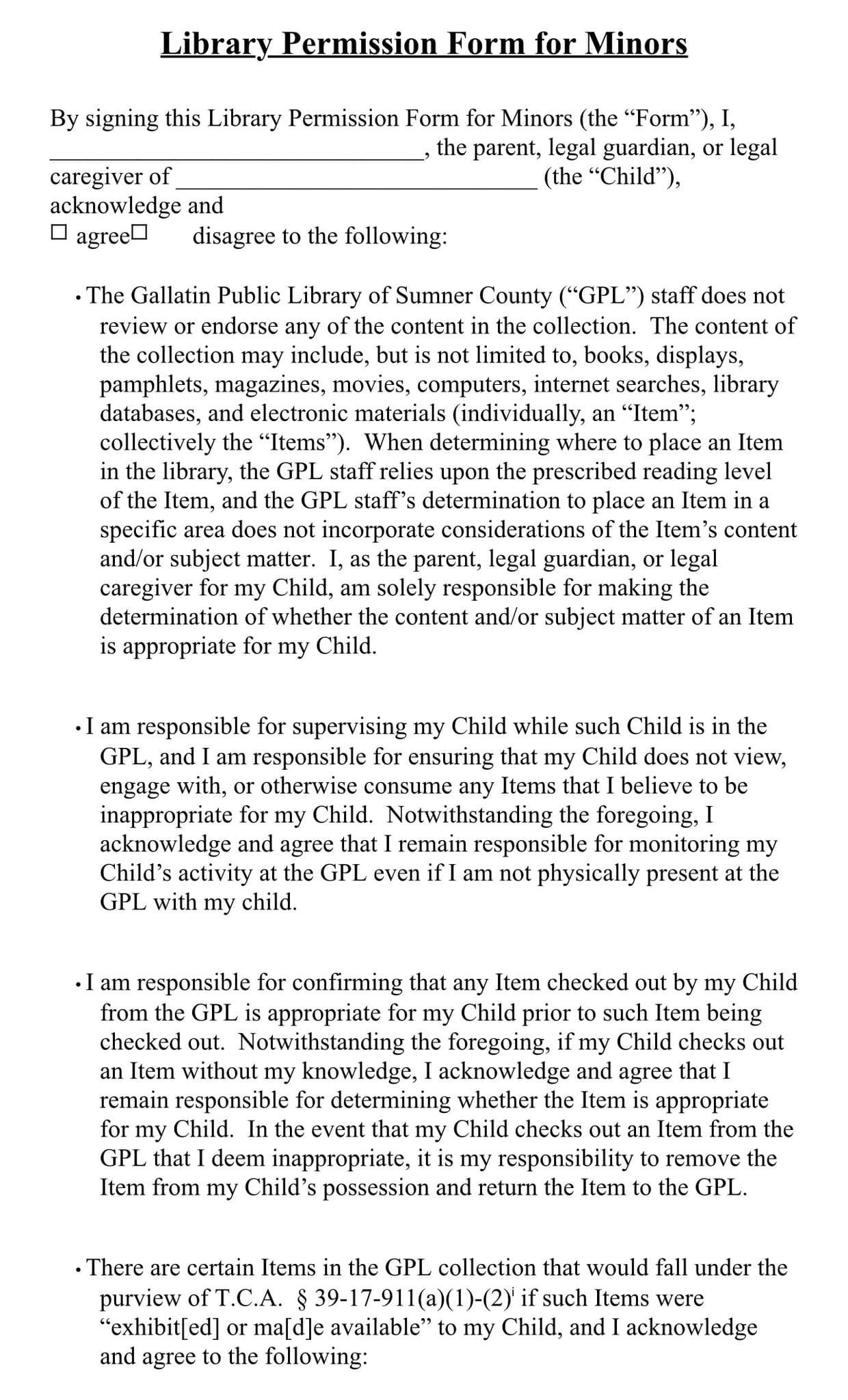 |
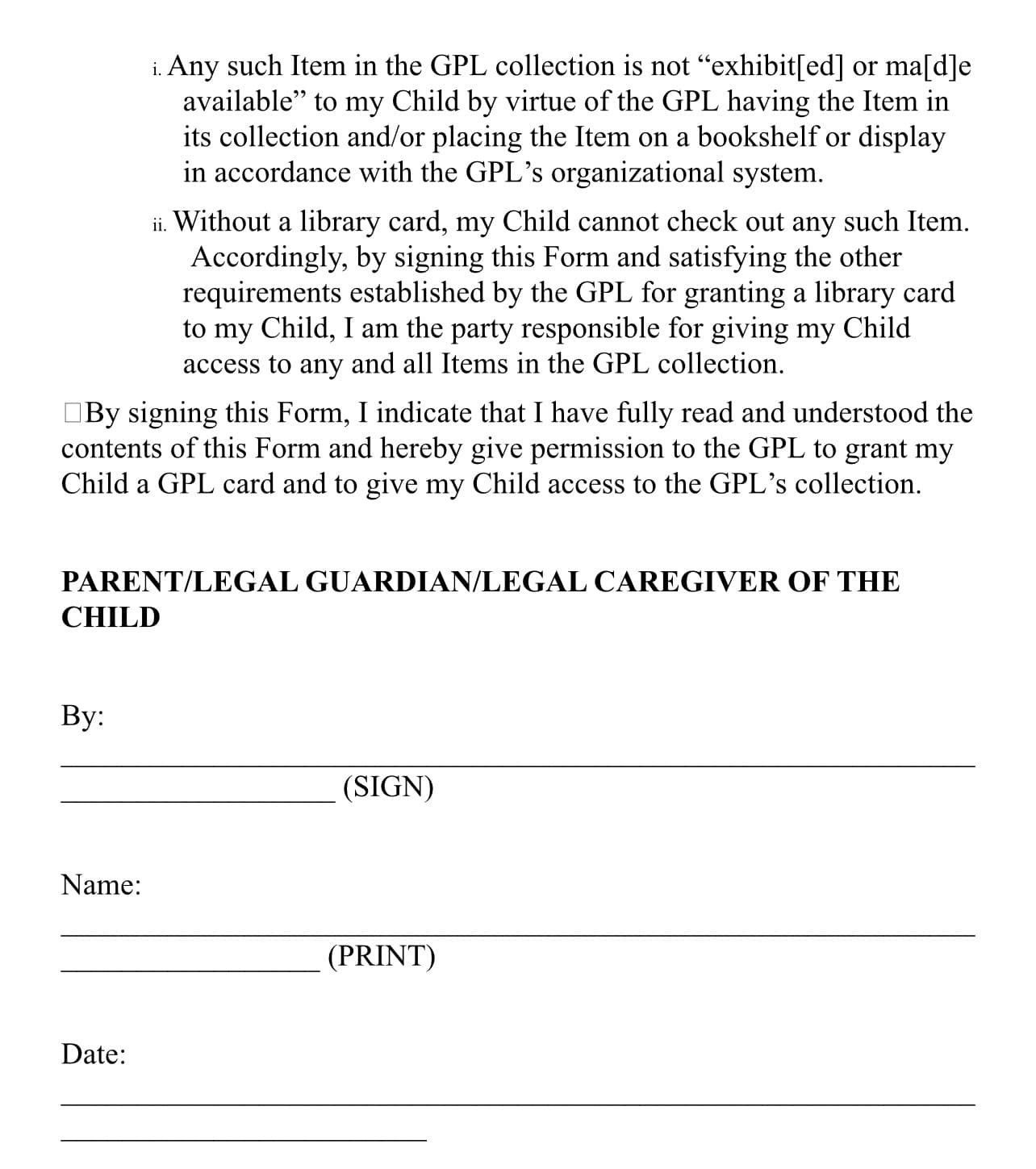 |
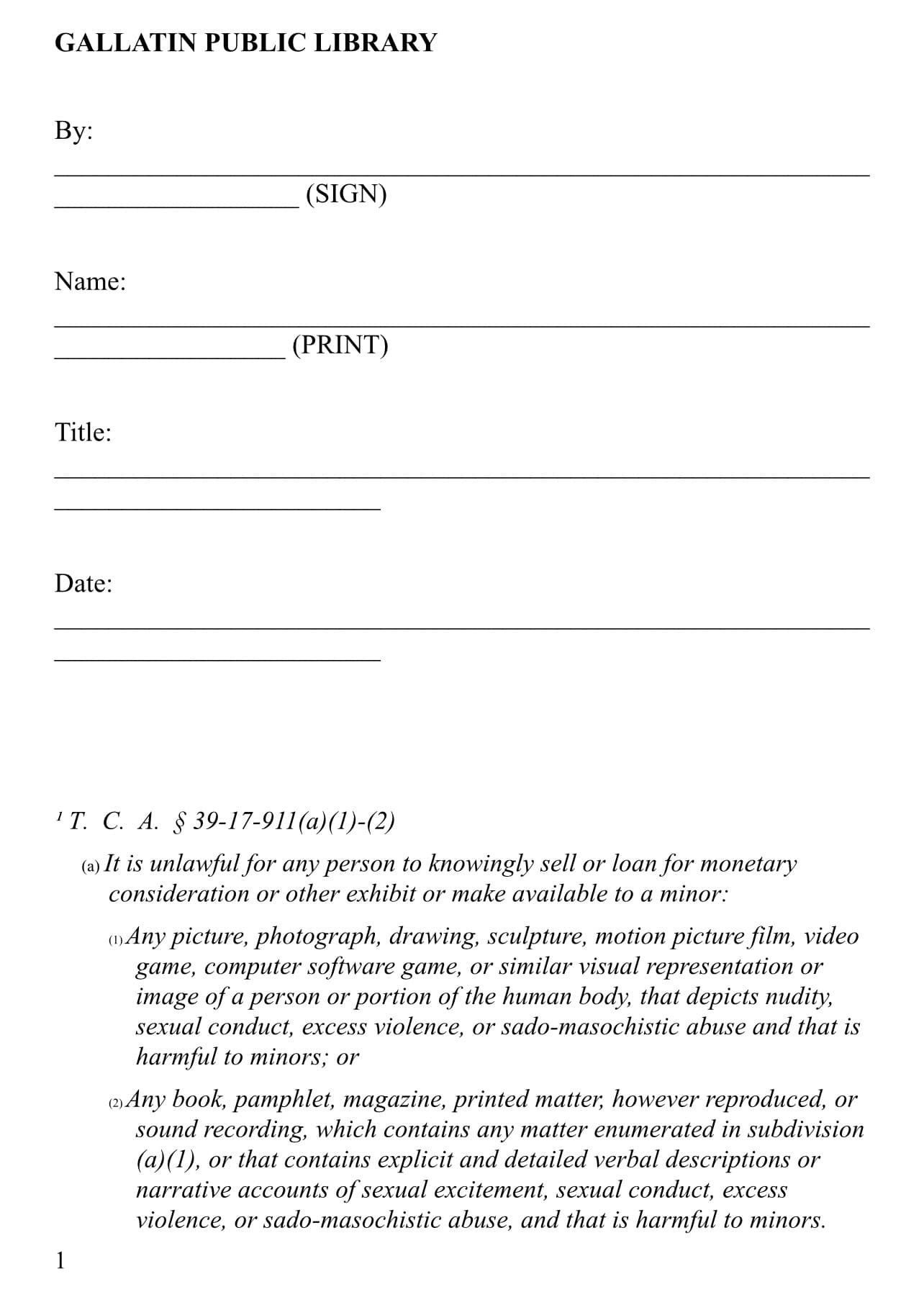 |
This week, it was also Barnes & Noble.
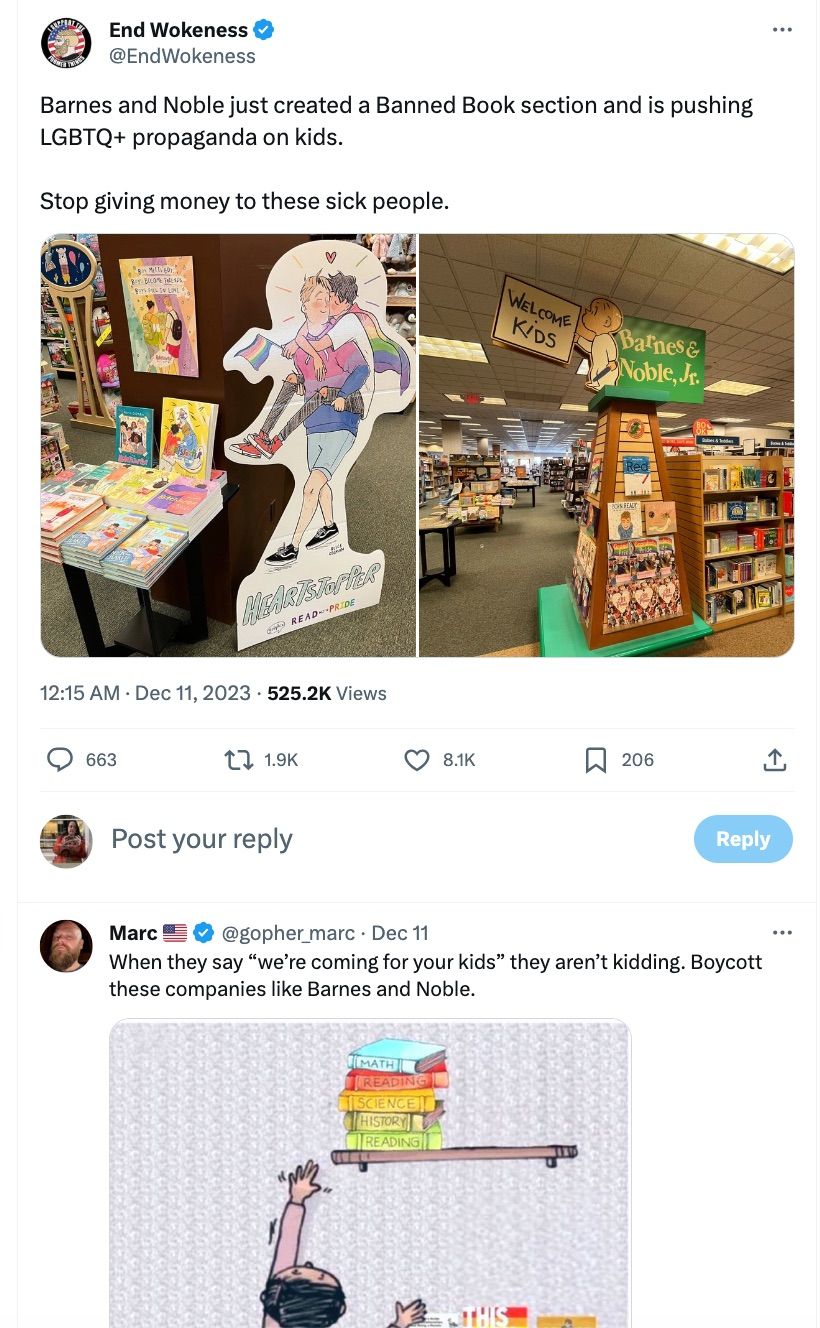 |
For all of the “we don’t ban books because kids can get those books at the bookstore or public library” contingent, the lies aren’t even good. They don’t like being called book banners because, they claim, it’s only the school libraries. We know this to be patently untrue.
For all of the “it’s only in bad states,” wake the hell up. It’s in your community, too, even if you’re choosing not to see it. We see it right in the survey results and in these weekly news roundups. Just read the comments on the above Twitter post.
Fascism isn’t all at once.
It’s slow and steady.
None of this is in the abstract.
We have had access to this and the proof now for years.
**Form and image are courtesy of the Sumner County Right to Read public Facebook group working to end the assault on their institutions.
Book Censorship News: December 15, 2023
Note: I’ve broken at least a dozen paywalls this week. Some of this is “subscriber only” content, meaning that only those who have the means to pay for their local news get access to the ways democracy is being trampled.
One parent just got 444 books “temporarily” removed from Elkhorn public schools (WI). ONE PARENT JUST GOT 444 BOOKS “TEMPORARILY” REMOVED. Take some time to get to know the policy that allowed this to happen. Marietta City School Board (GA) debated the fate of 23 books this week at its meeting. In a near-unanimous vote, the books are being banned. 21 books were pulled for review in Saydel Community School District (IA) to determine whether or not they complied with a new state law. The law is currently being sued by two different plaintiff groups. Almond Public Library (NY) is making a final decision on whether or not the book Grandpa’s Pride will remain in the public library later this month. A couple of other book challenges in Allegany County, New York, are in this story as well. “The New Hampshire Department of Education is heightening its scrutiny of books in libraries and classrooms, as schools continue to face pressure to remove titles that have LGBTQ+ characters or deal with mature or difficult sexual themes.” Keep your eyes on New Hampshire. Fascism is alive and well. Frederick County Public Schools (MD) finished their review of 31 books challenged in the district. Two books will be restricted to high school libraries, while one book, Triangles by Ellen Hopkins, will be banned. All of the rest of the titles will remain as-is. Another excellent piece from The Marshall Project on prison censorship and prison book bans. “Board members believe if the books aren’t good enough or are too obscene to be in places like public libraries, then perhaps they should not be sold in retail stores where they can also be easily accessed by the same group of students.” This is a line from a story about how Wilson County Schools (TN) might change their policy on who can challenge books, and 100% makes clear how much some of these board members know — or, more likely, care — about access and intellectual freedom. We know that, but it’s right here to see. In St. Louis Park, Minnesota, some Somali families are demanding opt-outs on LGBTQ+ lessons in schools. This is very similar to a lawsuit — which a judge denied — in Montgomery County, Maryland. Autauga County Commission (AL) has gone ahead and filled several Autauga-Prattville Public Library vacant board seats with the book banners — sorry, the “Clean Up Prattville” contingent. Hey, Oregon — the book banners are sharpening their axes in Tillamook. Shocker, all of the books they’re aiming at this moment are LGBTQ+. “The Leavenworth School District Board of Education [KS] voted 4-3 on Monday to pass revisions to an education policy that bans ‘gender identity’ and ‘sexual orientation’ references in the district’s elementary library books, despite objections from parents and students in the district.” Expect lots of books written *for* this age group to get banned in the district. Especially because the words in the policy are up to the interpretation of the book banners. It’s got to be embarrassing to affiliate with a political party who is so concerned about the needs of the community that they pass a resolution to demand their state disaffiliate with the American Library Association. Clyde-Savannah Board of Education (NY) might be waiting months to know whether or not the five books they determined were appropriate for library shelves in the school can actually go back on shelves. Yeah, you read that right. The school superintendent at Las Cruces Public Schools (NM) determined that Jack of Hearts (and Other Parts) could remain on shelves, and now the board has affirmed that decision. In good news, meet the Texas Freedom to Read Project, a parental group advocating for access and an end to discriminatory policies against students in the state of Texas. Brainerd High School (MN) will keep Empire of Storms on shelves. In De Pere, Wisconsin, the school board updated their book challenge policy such that once a decision on a book is made, the aggrieved only need to wait a year to complain again. This is a movement away from the previous three-year cycle and further away from the recommendation they got of waiting five years. They’re eager to get books banned, I guess. Compromise for not banning rainbow flags? The $5,000 grant that an educator in the Brandywine School District (MI) earned from We Need Diverse Books was approved by the board. You can enjoy this article which so perfectly lays out the mis- and dis- information about “inappropriate” books in schools. The board about denied $5,000 because of this absolute nonsense. “Brown said he started noticing the absence of the magazine over a period of months. When new issues came in, he observed that back issues were missing from the rack where periodicals like Out are kept for public access. Concerned, he inquired with the staff, who were also unaware of how or why the magazines went missing. This lack of clarity led Brown to confront the board president Bill Lantzy, who confirmed that Out was indeed being removed from the collection because it was deemed ‘inappropriate’ and allegedly contained nudity, Brown said.” In a small Pennsylvania public library, the board president thought he could simply remove things from the collection he didn’t agree with. That’s censorship! Because Moms For Liberty is headquartered in Brevard County, Florida, you’re going to see a similar thing start to happen across the country with more desperate attempts to ban books. They just got 13 more books banned this week. The Lexington-Richland Five school board (SC) voted to remove A Court of Mist and Fury from school libraries — even though the review committee said it could stay — as well as ban the entire A Court of Thorns and Roses series. “With the new policy, parents or guardians will be informed by email when their child checks out any book from the library unless they opt out of the notification process. They will also have the option to complete a form to restrict their child from checking out books of a certain title, series, author or specific classification section.” This is Franklin County Public Schools (VA). Seaside Public Library (OR) is hearing its first complaints in over a decade. The two picture books being challenged will shock you: And Tango Makes Three and When Aiden Became A Brother, two LGBTQ+ picture books. The complaints began with a city councilor. Elected officials doing this is creeping fascism. We knew that the new book banning members of the Corpus Christi (TX) public library board would be salivating to push their agenda and they wasted no time. The Williston High School library (ND) will not be banning 25 books though some will come with parental alerts if students borrow them. “Mason signed an ‘Education Over Indoctrination Pledge,’ during her campaign that states she will ‘Remove 100% of CRT, SEL, EDI, and Woke Indoctrination from the curriculum and administration.'” Mason got herself the role of Chair of New Hanover’s DEI committee and this week, the committee was ended. Are you paying attention yet? It’s not even hidden. Ottumwa Community School District (IA) removed 30 books it believes to be in violation of Iowa’s we hate gay people in books law, but the district will not disclose what those books are. Lake Travis Independent School District (TX) removed several books from the district last month, and a new policy under discussion might make book banning even easier. “The board, and others across the region, have been hearing complaints about books from speakers during public comments for several months. Since those complaints have come in, Burke County Public Schools has placed all books already categorized as 14+ content on a checkout suspension until the books can be reviewed for age appropriateness, according to information from BCPS.” This North Carolina district has banned check out of many YA books because of the bigots. This is censorship. Regional School Unit 56 (ME) is hoping to pass a new policy to ban all “sexually explicit” materials from district libraries. Same song and dance — the words aren’t defined, and it’s code for LGBTQ+ books only. This is the only district in Maine that banned Gender Queer. “The revised policy states that the district’s ‘education program, including all of its instructional materials shall not include pervavsive (sic) pornography, erotica,’ depictions of sexual violence and ‘inappropriate vulgarity or profanity, or other obscene material.'” This is Temecula, California. They cannot even spell pervasive correctly in their new, ridiculous policy. NONE of this is happening in schools. But cool moral panik (sic). To end on a better note, there’s now a hotline in Tennessee that young people can call and ask for a copy of a book banned in their community.Copyright
© Book Riot
